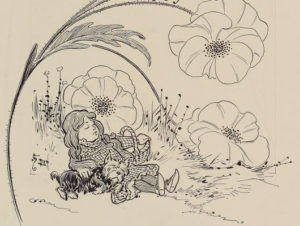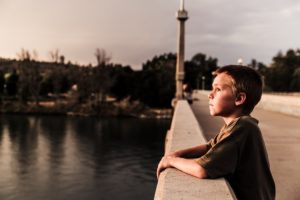Awakening In The Anthropocene
A long and dangerous slumber
 A recurring motif in our popular mythology is that of an enchanted sleep or dangerous slumber. Beyond Snow White and Sleeping Beauty, variations on the theme appear in classic mermaid tales where sailors are lulled to their final sleep; in Once Upon a Time, where the Evil Queen casts her sleeping curse; and in The Hobbit, when Bilbo awakens in Mirkwood to find himself ensnared in a giant spider web. In The Wizard of Oz, Dorothy and her companions find peril in a seemingly pleasant field of deadly sleep-inducing poppies. The beckoning of blissful slumber is nearly irresistible, and takes extraordinary willpower to overcome.
A recurring motif in our popular mythology is that of an enchanted sleep or dangerous slumber. Beyond Snow White and Sleeping Beauty, variations on the theme appear in classic mermaid tales where sailors are lulled to their final sleep; in Once Upon a Time, where the Evil Queen casts her sleeping curse; and in The Hobbit, when Bilbo awakens in Mirkwood to find himself ensnared in a giant spider web. In The Wizard of Oz, Dorothy and her companions find peril in a seemingly pleasant field of deadly sleep-inducing poppies. The beckoning of blissful slumber is nearly irresistible, and takes extraordinary willpower to overcome.
It doesn’t take too much metaphoric imagination to see that as a species – or at least for many of us living in the affluent West – we are suspended in our own dangerous slumber. Soothed to sleep by “consensus reality”, with its promise of technological progress and endless economic growth, we have fallen under the spell of consumer goods, entertainment, and distractions of all kinds. Meanwhile we live under a political-economic system that is pushing nature beyond it’s capacity to restore itself, and driving the climate toward extreme and unstable conditions incapable of supporting civilization.
Given the magnitude of our planetary impacts, many scientists believe we have initiated what qualifies as a new epoch in Earth’s geological timescale: the Anthropocene. In contrast to the biological abundance and the relatively stable climate that have characterized the 12,000 years of the previous epoch (the Holocene), the Anthropocene promises to be unlike anything our ancestors experienced. In addition to abrupt climate change, other evidence of the ‘human age’ that will remain for thousands or millions of years includes the chemical signals left behind from industrial activity and nuclear testing, along with traces of the mass extinction event that will be written into the fossil record.
 Unaware or in denial of the vast implications of our daily activity, much of humanity is sleepwalking into the Anthropocene, smartphones in hand.
Unaware or in denial of the vast implications of our daily activity, much of humanity is sleepwalking into the Anthropocene, smartphones in hand.
Yet not all are asleep and there are those who are desperately trying to shake the rest of us awake. Recently over 15,000 scientists from 184 countries signed an open letter titled a “Warning to Humanity”, saying that it is nearly too late to avoid widespread misery and catastrophic biodiversity loss. Similar alarms have been sounded from diverse quarters: citizens of desertifying lands and low-lying Pacific island nations, student activists, celebrities, spiritual leaders. Pope Francis recently issued a groundbreaking papal encyclical, Laudato Si, that emphasizes the inseparable link between socioeconomic inequality and ecological crisis. He implores Catholics and all others to take “swift and unified action” to “care for our common home”.
To stay asleep or rise and shine?
“Humans have been on the Earth for about 200,000 years, and the generation that's coming of age today is in a position that's unique… For the first time in human history it’s necessary to make a crucial decision: Will organized human life continue to exist on this Earth, or will it not? And that's not in the indefinite future. That's in the near future.” Noam Chomsky, 2016

In the simplest of terms, two options lie before us. The first is to stay asleep for as long as possible, whether from ignorance, denial, hopelessness, or complacency. Regardless of motive, that tale does not end well. The second option is to wake up and summon the will for rapid cultural evolution – transforming our species from a force of planetary destruction to one that lives within ecological limits. Embarking on the second path begins with the evolution of our consciousness and our worldview. We need new stories to live by: truthful and coherent explanations of how things came to be this way, where we fit in, and what needs to be done. And to be truly adaptive and capable of guiding our cultural, social, and spiritual evolution, our narratives need to inspire values and behaviors that are rooted in profound reverence for the entire web of life.
Yet our civilization has been built upon a very different foundation of beliefs and values. Our economic, financial, political, and legal systems have all been designed as if an inert planet will limitlessly provide our goods and absorb our wastes. These same systems have resulted in wealth and power being concentrated in the hands of a few privileged few, at the expense of nature and the common good. If we are to persist as a species, the principles and practices at the core of our global capitalist system need to be transformed, concepts like perpetual economic growth, corporate personhood, and unchecked wealth and property accumulation, along with a blind faith that technological progress will come to the rescue.
Beyond our ideas and institutions, we also need to transform the nuts and bolts of how we live: our infrastructure and built environment; how we grow food and use energy; the ways our activities are dispersed across the landscape, and our methods for transporting goods and people. All these aspects of modern industrial civilization took shape during the Age of Oil, when energy was cheap and polluting was free. Now we are faced with a colossal task of undoing much of what has been done, retrofitting and rebuilding in balance with nature.
We have gone so far astray, and there is so much mental and physical inertia to overcome, that the option of staying asleep and ‘dealing with everything later’ holds a powerful allure. In contrast, making the transition to ecological cultures will require an unprecedented marshaling of our collective will and organized effort. To catalyze that effort, we need nothing less than a planetary awakening: a shift in consciousness and an integrated social, political, ecological and spiritual movement far beyond what any of us have ever experienced, or likely even imagined. This global shift in the making has been given various names: The Great Turning, The Great Transition, The Great Transformation, or the Great Work of Our Times.
Millions of people around the world are already wide awake and participating in the Great Turning. This takes forms as diverse as sharing time in nature with children, supporting gender and racial equality, blocking oil pipeline construction, walking or biking to work, or switching to a plant-based diet. We are not yet, however, making the required changes anywhere near fast enough or on a large enough scale to avert the worst aspects of ecological and social collapse – thus the need for an evolutionary leap or awakening. The remainder of this piece explores what such a process might consist of. The next piece will delve further into the concepts, skills, and practices of evolutionary consciousness.
The Great Turning as a Fourfold Path of Awakening
As an individual and a collective phenomenon, awakening to the Great Turning can be understood as a four part process:
1. Awakening to our predicament
2. Awakening to the miracle
3. Awakening to a shared sense of identity and purpose
4. Awakening through action: Activating
1. Awakening to our predicament.
This entails getting real and facing the full implications of what our global capitalist civilization is careening toward: the cascading impacts of overconsumption, peak oil, climate disruption, and ecological overshoot; the resulting extreme weather, megastorms, deadly heat waves, and droughts; fresh water shortages and epidemics; soil depletion, crop loss and famine; disrupted supply chains, grid failure, resource wars (potentially nuclear) and the breakdown of economies and governments; acidified and deoxygenated oceans, burnt forests, and the loss of countless species. Racial injustice, extreme inequality, and social polarization. None of this is hyperbole, or limited to ‘somewhere else’, those unfortunate far-off corners of the world.
 We are at once challenged to face a bitter truth. Through our everyday actions, we are rapidly undermining the conditions for our children’s existence, as well as the diverse lifeforms we share the planet with. By continuing along the road of fossil-fueled economic growth we are driving Earth’s climate and ecological systems to tipping points of no return – at least on a human timescale. For those in the so-called developed world, all that has to happen is for good and normal people who love their family and country to continue living in our familiar ways, and the predictable result will be an impoverished and inhospitable planet that can no longer support healthy ecosystems or human societies.
We are at once challenged to face a bitter truth. Through our everyday actions, we are rapidly undermining the conditions for our children’s existence, as well as the diverse lifeforms we share the planet with. By continuing along the road of fossil-fueled economic growth we are driving Earth’s climate and ecological systems to tipping points of no return – at least on a human timescale. For those in the so-called developed world, all that has to happen is for good and normal people who love their family and country to continue living in our familiar ways, and the predictable result will be an impoverished and inhospitable planet that can no longer support healthy ecosystems or human societies.
Stating the predicament in simple terms, our global civilization faces a painful collapse that is accelerating with each decade, and only by evolving rapidly might we hope to avert the worst of it.
Speaking directly and openly about our predicament is not intended to instill fear, shame, or overwhelm. Yet the message can be challenging to hear, and to digest in its entirety. It has yet to fully sink in even for most educated, ethical, and well-intentioned people, loving parents and grandparents, teachers, professionals. Far more palatable is to reassure each other that things aren’t so bad, technology and positive thinking will save the day, or the right leader will come along and ‘make things great again’ so that we can continue living as we have been. But crossing our fingers, deferring action, and living in denial will only make it more difficult to change course.
The human story is at an unprecedented existential moment, and if there has ever been a time for deep reflection, contemplation, and soul-searching, this is it. What is life all about? What truly matters, and what doesn't? Who are we? How should we live and what should we strive for?
2. Awakening to the miracle.
All cultures throughout history have sought to understand reality and have crafted myths or cosmologies to explain the origins of humans, the heavens, and nature. Through millennia of careful observation and inquiry, ancient peoples also developed detailed and holistic knowledge of their world. Indigenous peoples past and present have often understood and approached the natural world with wisdom, reverence, and insight that is largely lacking in the dominant Western culture.
In recent centuries, the world’s astronomers, geologists, biologists and other scientists have continued humanity’s collective quest to understand our earthly and cosmic origins. Unlike previous peoples, modern science has had the tools and techniques – things like microscopes, telescopes, satellite imagery, and DNA sequencing – to fill in many pieces of the enormous jigsaw puzzle.
Yet while great quantities of scientific information and technical mastery were acquired, something important was all but lost along the way – a clear vision of the interrelated whole, and a felt sense that humans belong to that whole. Luckily that loss did not go unnoticed, and recently a number of story-tellers have managed to reweave a scientific and sacred account of the Universe and our role in it.
The resulting story is one of breathtaking beauty and complexity, and has been called the Epic of Evolution, or simply the Universe Story. From a great flaring forth 13.8 billion years ago, to the present day, and from the smallest particles to the largest galactic superclusters, all is interconnected as one intricate whole. Wild irises emerge from streambanks in springtime and giraffes peer out from the shade of acacia trees. Entire galaxies collide and merge. Upright apes sing together in transcendent harmony, beholding, celebrating, and participating in the glory of it all. These things and many more all happen simultaneously in a vast and unfathomably complex process of cosmogenesis, where Creation is not merely something that happened long ago, it is ongoing in the ever-present moment.

In many ways, the Epic of Evolution resonates with the deepest wisdom offered by the world’s spiritual traditions and indigenous cultures. Key themes of the Epic include interdependence, continual cycles of creativity and destruction, and transformation – not to mention, mystery. While the scientific narrative explains much, the whole tale is satisfyingly rooted in the unknown. What preceded the Big Bang, and what lies beyond our Universe? How did human consciousness arise, and life itself? And then perhaps the greatest mystery – that any of this exists at all.
“Science, you might say, has discovered that our existence is infinitely improbable, hence a miracle.” (John Horgan)

Here at the junction of the known and the unknown we can pause in wonder. While our current vision of the Universe includes hundreds of billions of galaxies, each with untold billions of potentially life-bearing planets, for the time being there is but one small planet, twirling on its axis and looping around its life-giving star, that stands out as being particularly wonderful and worthy of defending.
3. Awakening to a shared sense of identity and purpose.
Dwelling too much on our predicament, without keeping in mind the larger context of the Epic, might lead to denial, disempowerment, or despair. On the other hand, while focusing on the evolutionary miracle can inspire awe and appreciation, if we fail to grasp the reality of our predicament we might strive for only superficial and gradual change, without a sense of urgency.
Instead, what might arise if we can simultaneously maintain awareness of both the predicament and the miracle, integrating them in our understanding of reality? Our current earthly predicament can be understood as the latest chapter in the evolutionary epic. We now have a fleeting opportunity to play a vital role in the story by realizing our potential for conscious evolution. As an embodiment of the dynamic universe we are infused with the same creative life-force or evolutionary impulse that has given rise to all the other forms and creatures in the Universe. To the extent that we can embody that creative force, our thoughts, intentions, words and actions take on new significance as part of the evolutionary process itself.
 Perceiving ourselves as evolutionary beings in an imperiled biosphere can awaken a profound sense of vitality, belonging, and a shared sense of identity and purpose. Thus empowered, we no longer have to succumb to the narrative that we are fatally flawed creatures, disconnected consumers, and inconsequential cogs in a machine that is destined to destroy the biosphere. We now know that we have a more important role as that dimension of the planet and the Universe that can turn its gaze inward and outward, contemplating and celebrating the magnificent whole. If we can muster the individual and shared vision, creativity, and perseverance, we can also embody the Universe’s potential to consciously evolve.
Perceiving ourselves as evolutionary beings in an imperiled biosphere can awaken a profound sense of vitality, belonging, and a shared sense of identity and purpose. Thus empowered, we no longer have to succumb to the narrative that we are fatally flawed creatures, disconnected consumers, and inconsequential cogs in a machine that is destined to destroy the biosphere. We now know that we have a more important role as that dimension of the planet and the Universe that can turn its gaze inward and outward, contemplating and celebrating the magnificent whole. If we can muster the individual and shared vision, creativity, and perseverance, we can also embody the Universe’s potential to consciously evolve.
At this point in our journey, facing our predicament with a unified sense of purpose makes far more sense than maintaining fear-based nationalist and religious identities that distract, delude, and separate us, inhibiting us from realizing our full shared potential. Moving toward unity will also entail addressing the forms of economic, race, and gender-based privilege and inequality that cause suffering and keep us apart. Imagine the power of people from all nations and cultures sharing the vision of a Great Turning, rooted in love for our living planet and existence itself, mutually supporting each other in solidarity, honoring and celebrating our diversity, and collaborating toward our common goals.
4. Awakening through action: Activating.
 This fourth part is where the fruits of expanded consciousness – awakening to miracle, predicament, and a shared sense of purpose – are put into practice in one’s life, and the world. Questions arise in the awakening heart and mind: What is my role? What interests me and stirs my passion? In what ways large or small can I use my strengths, my gifts, and my time on Earth to contribute, to celebrate and honor life, and to help heal humanity’s relationships with each other and with the planet?
This fourth part is where the fruits of expanded consciousness – awakening to miracle, predicament, and a shared sense of purpose – are put into practice in one’s life, and the world. Questions arise in the awakening heart and mind: What is my role? What interests me and stirs my passion? In what ways large or small can I use my strengths, my gifts, and my time on Earth to contribute, to celebrate and honor life, and to help heal humanity’s relationships with each other and with the planet?
Activating is about empowerment, personal responsibility, and deliberately engaging with the Great Turning and evolution itself. This may entail deep reflection on one’s current lifestyle and life plans, and a shift in one’s priorities, aspirations, and daily routine. It may involve great courage, opening one’s mind and heart, standing up for one’s beliefs, and daring to forego social norms and expectations. It may also mean opting to live simply and embrace restraint, prioritizing abundant health, relationships, and community over maximizing possessions, and personal gain. Even if one is not up for full-scale life transformation, initial steps like eating more local foods, using less energy, mentoring young people, or supporting a promising local candidate’s campaign may be within reach. This is not about adhering to dogma, or pressure to be uniformly magnanimous at all times – everyone’s activation will take a different path and no one is keeping score.
Beyond individual awakening and action, activating in its most exciting form is co-activating – a shared process. What is our role? In what ways can we join creatively to bring the Great Turning to life? How can we restore degraded streams, forests, and other wild places? How can we share resources so that none of us has to work such long hours to make ends meet? How can we build social and political movements that can turn the tide, cultivating new norms and institutions for an evolutionary culture-shift?

Conclusion
While I am wholeheartedly advocating for a full-scale evolutionary awakening, I am not declaring that it is imminent or inevitable. Yet neither am I proposing to merely press forward with business as usual while crossing one’s fingers and hoping that at some point the clouds will part, the angels will sing, and a mass-awakening will occur.
If corporate capitalism continues on its current trajectory, social and ecological conditions will continue to deteriorate, while economic instability and extreme weather events increase in severity and frequency. As the Anthropocene intensifies, and more people feel the impacts, it will also become clear that the cumulative effects of climate change are outpacing society’s ability to respond and recover. Under such conditions, an awakening to the predicament is likely to pick up steam, with more parents and grandparents coming to face the reality of what the Anthropocene means for their children and grandchildren. More young people will figure out that the worldviews, aspirations, and life strategies that worked for their parents and teachers may no longer apply in the present age.
For those who are so inclined, the invitation for now is to:
- embrace both the predicament and the miracle;
- cultivate an evolutionary consciousness;
- connect with others locally and globally, learning and organizing together, building a sense of shared identity and purpose;
- activate in whatever ways inspire you, and don’t hold back.
As larger numbers of people awaken to the predicament, the newly-aware will benefit greatly from contact with individuals and communities who are grounded in a coherent “big picture” perspective, who have awakened to the miracle, and are already living an activated life.
The paradox of the age we are heading into is that while there will be a greater likelihood of struggle, suffering, and unpredictability, for those who can join together in solidarity and resilience, life may also hold new and unforeseen opportunities for connection, meaning, and joy that are scarcely known in the age of egoism, separation, and consumerism. At the risk of romanticizing the hard times to come, those opportunities may include things like living in communities of mutual support, being part of an inspired collective effort, and gaining a deep appreciation for life itself and a heightened experience of being alive.
Regardless of how the Anthropocene unfolds, it promises to be a difficult age to sleepwalk through.
Inspirations, Sources, Credits
SOURCES AND INSPIRATIONS
Some of the primary sources of ideas and inspiration for this piece include Thomas Berry and Brian Swimme, Joanna Macy, David Korten, and Barbara Marx Hubbard.
The John Horgan quote is from “Seeing the Miracle of Existence in the Darkest of Times” by John Horgan in Scientific American. 12/18/16 https://blogs.scientificamerican.com/cross-check/seeing-the-miracle-of-existence-in-the-darkest-of-times/
Noam Chomsky quote from his ‘Doomsday Clock’ presentation. https://www.youtube.com/watch?v=mrE5EZr5ZVY
Illustration of Dorothy and Toto sleeping in the poppies by W.W. Denslow from the Wizard of Oz by Frank Baum (1901).


Trackbacks/Pingbacks
You must log in to post a comment.